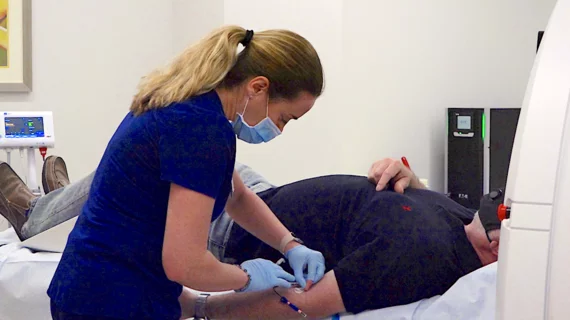NRC petitioned by patient advocacy group to require reporting of extravasation
A group of patients and patient advocates is petitioning the Nuclear Regulatory Commission to update a 42-year-old policy pertaining to the reporting of certain accidental patient exposures to radioactive pharmaceuticals that can occur during various imaging procedures.
On June 2, Patients for Safer Nuclear Medicine, which is comprised of 29 patient advocacy organizations, submitted an Information Correction Request to the NRC requesting that the commission correct their policy that exempts providers from reporting accidental patient exposures—specifically extravasations.
Extravasations occur when small amounts of radioactive drugs are unintentionally injected into a patient’s tissue instead of their vein during various nuclear medicine procedures.
“Significant extravasations of diagnostic radioactive drugs can compromise images used to guide patient care and can result in high doses to patient tissue and skin. In addition to the dose to tissue, skin and the patient’s lymphatic system, therapeutic radioactive drug extravasation also means the therapy is not being delivered as intended. It is critical to patients that radioactive drug administrations are monitored, and large extravasations are immediately identified so clinicians can begin mitigating the dose right away," said John Witkowski, President of UPPI, which represents 60 independent and institutional radiopharmacies across the US.
Media shared on the Patients for Safer Nuclear Medicine website claims that more than 500,000 patients have been harmed due to extravasation. Said harm, the group suggests, comes in the form of potential misdiagnosis that can occur due to poor image quality after extravasation, incorrect treatments and damage to the skin or tissue.
The group is advocating for the NRC to treat significant extravasations in the same manner as any other reportable adverse medical event.
“We now know that extravasations can almost be eliminated. Correcting the 1980 exemption policy will ensure that large extravasations are measured, and most importantly patients and their physicians will be informed. Patients need to know if their care is affected. The worst approach is to do nothing and wait for patients to be injured,” Mary Ajango, spokesperson for Patients for Safer Nuclear Medicine, said in a statement.
The statement released by the group indicates that the contrast media shortage gives an added sense of urgency to the situation, as some patients’ imaging will be shifted to nuclear medicine.
For more information, click here.
Related nuclear medicine news:
Wisconsin company to begin producing medical isotopes next year
New radiohybrid PET imaging agent increases detection of prostate cancer recurrence
CMS coverage decision for Alzheimer's drug, related PET scans sparks concern in imaging community
Simple, proven strategies to reduce extravasation of contrast media during CT scans

